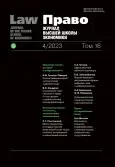Changing Developer of Problem Object: Analysis of Legal Regulation
- 作者: Zykov D.1
-
隶属关系:
- Volgograd State University
- 期: 卷 16, 编号 4 (2023)
- 页面: 233-258
- 栏目: Russian Law: Condition, Perspectives, Commentaries
- URL: https://journal-vniispk.ru/2072-8166/article/view/318273
- DOI: https://doi.org/10.17323/2072-8166.2023.4.233.258
- ID: 318273
如何引用文章
全文:
详细
作者简介
Dmitry Zykov
Volgograd State University
Email: noreply@hse.ru
ORCID iD: 0000-0002-5544-5459
Candidate of Sciences (Law), Associate Professor
参考
- Bleschik A.V. (2015) Reproducing norms of federal legislation in the legislation of the constituent entities of Russia. Rossiyskoye pravo: obrazovaniye, praktika, nauka=Russian law: education, practice, science, no. 4, pp. 86-90 (in Russ.)
- Davydova M.L. (2020) “Smart regulation” as a basis for improving modern lawmaking. Zhurnal rossiyskogo prava=Journal of Russian Law, no. 11, pp. 14-29 (in Russ.) DOI:https://doi.org/10.12737/jrl.2020.130
- Fedortsova R.P. (2013) Legal regulation of the change of the developer in shared construction. Notarius=Notary, no. 5, pp. 30-33 (in Russ.)
- Gorbunova E.N. (2014) Legal regulation of the rights of participants in shared construction. Candidate of Juridical Sciences Thesis. Moscow, 201 p. (in Russ.)
- Grebenyuk O.B. (2012) Restoration of housing rights of defrauded equity holders as a priority for the Russian prosecutor's office. Aktual'nyye problemy rossiyskogo prava=Actual Issues of Russian Law, no. 4, pp. 138-150 (in Russ.)
- Khamov A. Yu. (2019) Legal protection of participants in equity construction relations. Candidate of Juridical Sciences Thesis. Moscow, 224 p. (in Russ.)
- Kolyadin K.S. (2012) Prospects for the development of the institution of participation in shared construction. Sovremennoye pravo=Modern Law, no. 10, pp. 66-69 (in Russ.)
- Kondratiev I.V. (2016) Trust, but verify: the problems of investing citizens' money in the construction of apartment buildings. Zakony Rossii: opyt, analiz, praktika=Laws of Russia: experience, analysis, practice, no 2, pp. 89-94 (in Russ.)
- Kulkov A.A., Yakupova A.A. (2020) Analysis of changes in the legislation on shared construction and its impact on the residential real estate market. Ekonomika, predprinimatel'stvo i pravo=Economics, Entrepreneurship and Law, vol. 10, no. 11, pp. 2681-2700 (in Russ.) DOI:https://doi.org/10.18334/epp.10.11.111122
- Kurakova O.A., Maiorov M.V. (2018) Shared construction and alternative methods of financing the construction of residential real estate. Ekonomika i predprinimatel'stvo=Economics and Entrepreneurship, no. 4, pp. 1032-1035 (in Russ.)
- Kuznetsov A.P. (2015) Developer bankruptcy: theory and practice of protecting rights of citizens participating in construction. Moscow: Statut, 208 p. (in Russ.)
- Lashmanov O.I. (2017) Legislative regulation of participation in shared construction: reality and prospects. Vestnik Mariyskogo gosudarstvennogo universiteta. Istoricheskiye nauki. Yuridicheskiye nauki=Bulletin of the Mari State University. Historical Sciences. Legal Sciences, vol. 3, no. 3, pp. 84-87 (in Russ.)
- Slezhenkov V.V. (2023) From “less regulation” to “smart regulation”: the main aspects of the conceptual transformation. Zakon i pravo=Legislation and Law, no. 1, pp. 85-93 (In Russ.) DOI:https://doi.org/10.56539/20733313_2023_1_85
- Topal E.G. (2017) State support for deceived shareholders. Reorganization, interaction with a surveyor as mechanisms for realizing property rights of defrauded equity holders. Imushchestvennyye otnosheniya v Rossiyskoy Federatcii=Property Relations in the Russian Federation, no. 12, pp. 36-50 (in Russ.)
- Tretyakova E.S. (2009) Reproduction (duplication) in the normative acts of the constituent entities of the Russian Federation of the norms of the Constitution of Russia and federal laws. Sovremennoye pravo=Modern law, no. 11, pp. 30-33 (in Russ.)
- Tsukanova E.Yu., Bondarenko A.V. (2018) Participation in shared construction and membership in housing cooperatives as ways to exercise the right to housing. Pravo i praktika=Law and Practice, no. 2, pp. 126-132 (in Russ.)
- Usenkov I.A. (2022) National soft Law as a legal phenomenon and a tool for improving stability of legislation. Law. Journal of the Higher School of Economics, vol. 15, no. 1, pp. 28-58 (in Russ.) DOI:https://doi.org/10.17323/2072-8166.2022.1.28.58
补充文件








